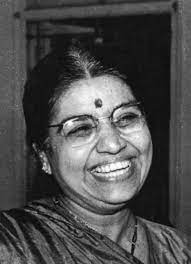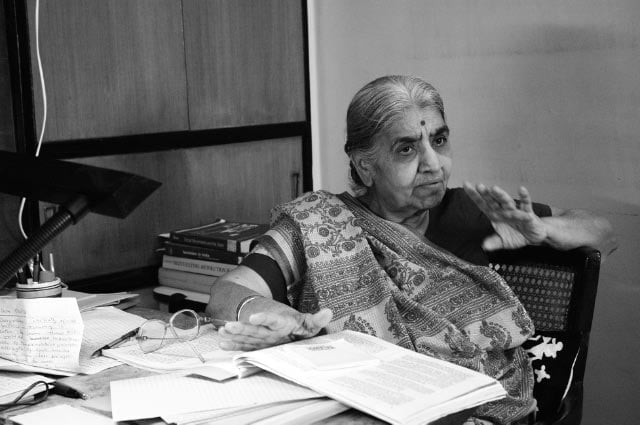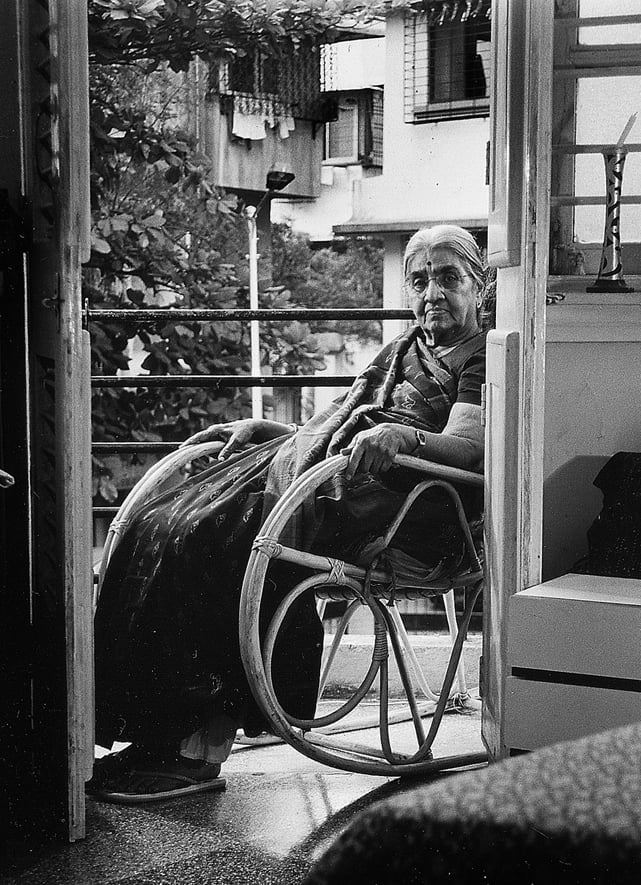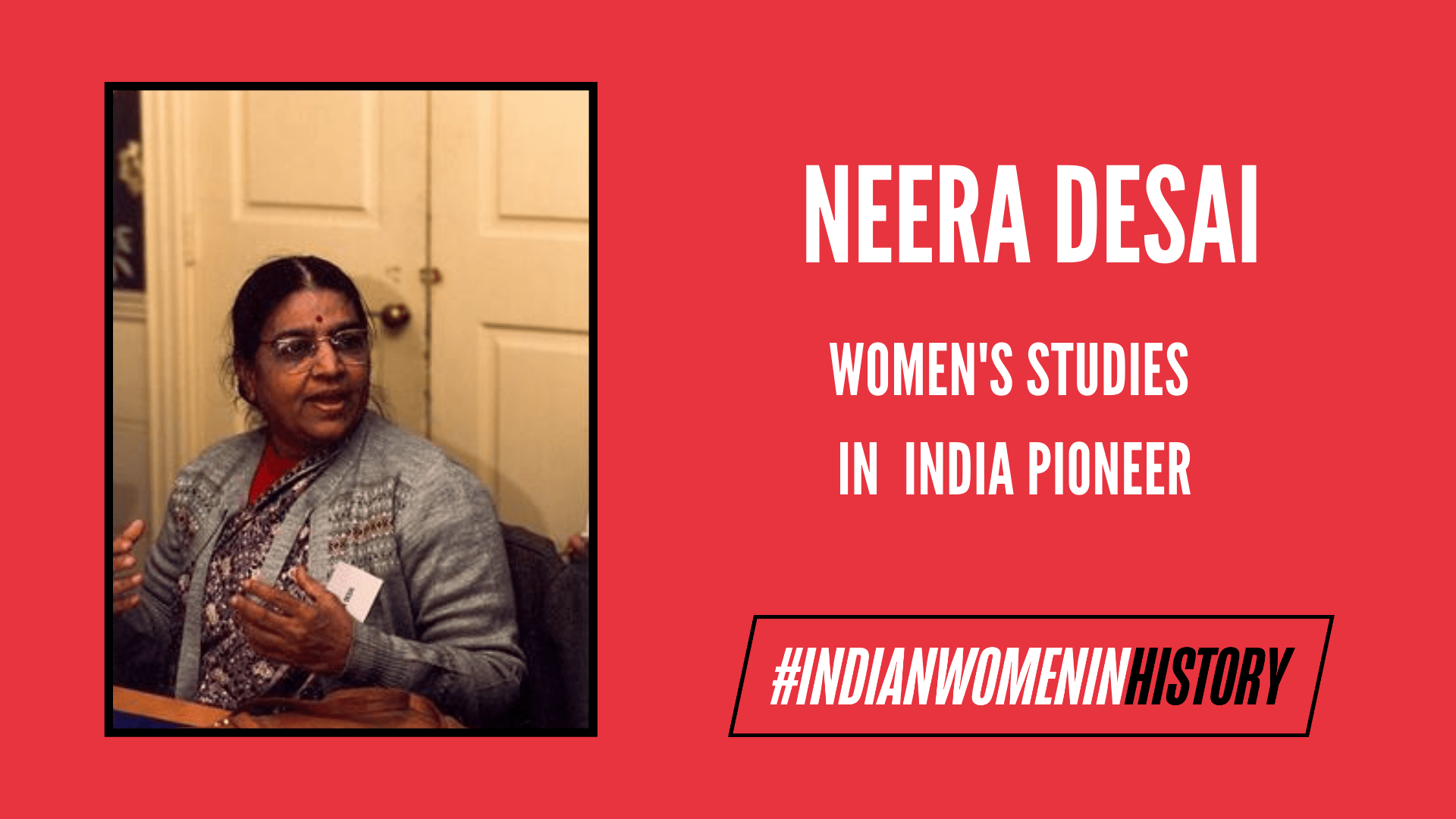Neera Desai was the founder of the first research centre for women’s studies in India. She wrote many books and papers, bringing to light women-specific concerns, which were often overlooked after India became independent. But her work reached far beyond the confines of academia. She was dedicated to grass-root initiatives, being associated with organisations like Vacha: Women’s Resource Centre, India Centre for Human Rights and Law, Sound and Picture Archives for Women in Mumbai and many more. She believed that Women’s Studies must move beyond pure theory, diving into the realm of meaningful action for progressive change.
Early life and political journey
Born in Ahmedabad in 1925, Neera Desai’s family moved to Bombay when she was a year old. She grew up in Bombay as the second of three siblings. Her father was a solicitor, and her mother was extremely involved in local activities relating to education and nationalist movements at the time, including the non-cooperation movement of the 1930s. Desai recalled fondly in an interview that her mother always ensured a liberal environment at home, making certain that her children were dedicated to causes larger than their own. Her upbringing was an upper-caste, middle-class urban kind, the privileged experience of which she does seem to acknowledge when stating her stance in her work.

In 1942, she joined the Elphistone College in Mumbai but decided not to pay the college fees, as the Quit India movement was gaining hold. She spent that year attending meetings, listening to talks by both the Indian National Congress and the Communist Left at the time. She was even arrested by the police while attending a meeting held at Chowpatti beach. A year later, she rejoined Elphistone to continue her studies. In her year away, Desai became increasingly sensitive towards political issues. As she rejoined college, she came in contact with the women leaders of the time, including Aruna Asif Ali and Kamaladevi Chattopadhyay.
One of the greatest influences on her life and work was of a lesser-known social worker and Congress MP, Pushpa Mehta. She was the first woman to start a rescue home for women, providing educational and employment resources for them. Desai said, her dedication inspired her in many ways.
She met her husband Akshay Ramlal Desai, a Marxist sociologist and social activist, through political study circles. He was a Professor and Head of the Department of Sociology at the University of Bombay in 1967. They got married in 1946. Their son Mihir Desai is a prominent human rights lawyer, practicing as senior counsel in the Bombay High Court and the Supreme Court of India. He has handled cases on fake encounters, mass murders, riots, custodial deaths.
Academic career
Neera Desai was the first and founding director of the Research Centre for Women’s Studies at the SNDT Women’s University. Started in 1974, this was the first centre for women’s studies in India. She also founded the Centre for Rural Development (CRD) in SNDT Women’s University, Mumbai to transform women’s reality through feminist activism.
Neera Desai’s Sociology MA thesis was titled ‘The impact of British Rule on the Women of India’. British rule in India had just come to an end, and at the time, women were seldom the subjects of any intensive study. She wanted to examine the status of women pre-independence, and the changes that were taking place amid the economic, political and social transformation.

Her work put forth ideas we take as precedents today. She contributed greatly in linking women’s subjugation to the overall structure of patriarchy and capitalism, specifically in the Indian context.
Her works include –
- Neera Desai, Woman in Modern India (1957; repr. Bombay: Vora & Co, 1977)
- Neera Desai, The Making of a Feminist, Indian Journal of Gender Studies 2 (1995)
- Neera Desai, Traversing through Gendered Spaces: Insights from Women’s Narratives, in Sujata Patel and Krishna Raj (eds), Thinking Social Science in India: Essays in Honour of Alice Thorner (New Delhi: Sage, 2002). Another version was published in Gujarati in 1997.
- N. Desai and S. Gogate, ‘Teaching of Sociology through the Regional Language’
- Neera Desai, Women and the Bhakti Movement, in Kumkum Sangari and Sudesh Vaid (eds), Women and Culture (Bombay: Research Centre for Women’s Studies, SNDT Women’s University, 1994).
Also read: The Evolution Of Women’s Studies In India
An important aspect of her work was the acknowledgment of the agency of the women she studied. Lower caste women are often studied as victims of circumstance, such an analysis portrays them as unquestioning, passive acceptors of their conditions. Desai’s work, unlike many other upper caste writers, notes the negotiation and conscious decisions made by the women studied.
Linking academia to action
Desai advocated that Women’s Studies as a field that could never remain confined to the realm of theory. She believed that “The aim of women’s studies must always be Research, Action, and Teaching.” She distinguished Women’s studies from other social scientific disciplines, stating that,
We are not merely concerned with the study of social phenomenon, we want to change the structure, the laws, and whatever comes in the way of women’s liberation. In doing so we come in violent conflict with other social sciences, which advocate for value neutrality.
The research centre at SNDT Women’s University was committed to action. A few years after it was established, they traveled to a town in Gujrat called Udvada. Here, they talked to women, specifically lower caste women from seven villages, to understand their conditions and their demands for change. Based on this information, they built a program to empower and conscientise the women, in their social context. By doing this, the program gave agency to the affected women, rather than imposing their own, often urban ideas of freedom. Throughout her career, Desai emphasised on supporting local women’s groups in their own forms of action. This was what true action and support meant for her.
She worried about the growing distance between women’s studies and the women who were most brutally affected by patriarchy and other structures of subjugation. Its language and method are in many cases inaccessible to the women whom it aims to empower. Stating,
We started Women’s Studies by saying that we are going to speak the language that poor women understand, in an area that they understand, but what we speak today… even we don’t understand it.
She proclaimed her identity as a feminist in the 70s, a time when the term was greatly contested. She travelled to various international women studies conferences between 1977 and 1979 interacting with liberal, radical and socialist feminists, which she said enriched her understanding of the discipline, and women’s conditions.

Complex intersectional stance
Desai’s stance on intersectionality is one that can be critiqued. While she did give agency to the lower caste women she studied, her underlying belief was that all women, irrespective of class, caste, race, ethnicity must stand united against patriarchy, since they were all suffering at the hands of it. One must then note that the degrees of suffering vary drastically for each group. There are many instances where upper-caste women chose to show solidarity to their caste identity over gender Identity. Why are the oppressed expected to unite with one oppressor to fight against another?
Still, Desai held that these differences were used by the patriarchy to create a rift within the women’s movement, weakening its overall fervour.
It is important to note here that Desai was also critical of the nationalist movement in that it was resistant to women-specific demands, often dismissing them when pursuing the larger goals of independence from British rule. One is then prompted to ask, if Desai was able to detect the fallacy within the independence movement, why did an equivalent fallacy within the Indian women’s movement not merit equal attention?
Desai, or ‘Neeraben‘ as she was often called by her colleagues and friends, passed away in 2009 at her Dadar residence in Mumbai. She was 84 and suffering from cancer.
Despite this, Desai’s contribution to the women’s movement in India is immense. She was a pioneer in her field, committed to action, help, and change. And for this, she must always be remembered.
Also read: Vina Mazumdar: A Pioneer Of Women’s Studies | #IndianWomenInHistory
References
- All quotes and personal life information are taken from a 2005 Interview with The Global Feminist Project.
About the author(s)
Yana is currently a third-year sociology student at Lady Shri Ram College. She is trying to understand the world around her. Though she is easily amused and often distracted, she hopes these traits will come in handy at some point.




